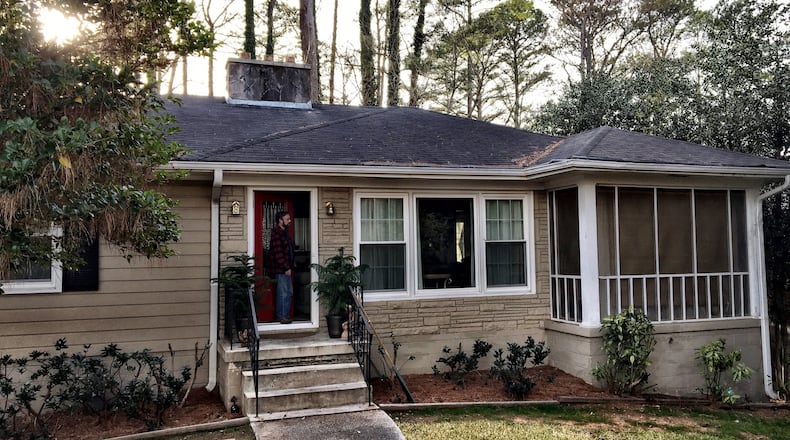Before Emory University and Atlanta could get married, they needed to touch.
Emory wants to be annexed into Atlanta's city limits, a union that could reshape the region and gain access to city tax funding for a MARTA branch line through a sprawling campus covering more than 600 acres.
But first, the university and the city had to make a connection. Georgia law requires a shared border between cities and areas seeking annexation.
Emory completed that link when it quietly bought a one-story home along Briarcliff Road last year, according to property records examined by The Atlanta Journal-Constitution. The city of Atlanta's border runs through 72 feet of the property's back yard, creating a bridge to the university, which also owns the Campus Crossings apartment complex across the street.
With that obstacle out the way, Emory may soon apply to join Atlanta. A City Council vote would finalize Atlanta’s expansion.
The 1,240-square-foot house, which sold for $345,000, is being rented by Emory to a couple that recently moved from California. They didn’t know their home, built in 1949, was so critical to the university’s plans.
“I had no idea,” said Trond Manskow, a retired electrical contractor who wanted to live closer to his children. “It’s one of the few places we could find that was convenient for us.”
Emory already has an Atlanta mailing address and markets itself as part of the international city, though it’s currently separate from any municipality as part of unincorporated DeKalb County.
The primary motivation for joining Atlanta is a light rail line called the Clifton Corridor, a planned streetcar line that would run from Lindbergh Station in Buckhead to Emory in Druid Hills.
Atlanta voters approved a half-cent-per-dollar sales tax in November that will raise about $2.6 billion over the next 40 years for the Clifton Corridor, rail stations, buses and other improvements.
The Clifton Corridor light-rail line could eventually be extended further, from Emory to Avondale Station in Decatur. But portions of the line outside the city of Atlanta would need to be paid for by a similar half-cent sales tax increase in DeKalb, which hasn't been approved by state legislators.
Emory didn’t announce its annexation intentions before buying the key property at 1664 Briarcliff Road, near the Sage Hill Shopping Center.
A company called WCE Holdings B LLC bought the property June 29 and then deeded it to Emory on Aug. 1. Representatives for WCE Holdings B didn’t return phone messages seeking comment.
“We were just so happy to sell it,” said Barbara Brown, one of the previous co-owners of the house who had used it as a rental property since buying it for $269,000 in 2006. “I’d like to see Emory become part of the city of Atlanta, but I didn’t know I was doing anything toward that with this transaction.”
Not everyone wants Emory to abandon unincorporated DeKalb.
If Emory moves into Atlanta, surrounding neighborhoods could choose to follow. The Druid Hills community as a whole isn’t seeking annexation, but individual streets and subdivisions could ask to join the city.
Jon Fidler, who lives in the Lindmoor Woods subdivision outside Decatur, said he’s concerned Emory’s drive toward cityhood will weaken DeKalb County and further divide the region.
“This notion of possibly annexing hundreds of acres, based on a stretch of land that’s literally 72 feet wide, isn’t against the letter of the law but is against the intent of the law,” Fidler said. “DeKalb County is taking major steps toward improving its government, and annexation might undo a lot of that when we end up balkanizing a lot of the county.”
Emory officials said last fall they hoped to apply for annexation to the city of Atlanta by the end of 2016, but the process has moved slower than anticipated.
“Emory continues to explore annexation into the city of Atlanta,” said Megan McRainey, a spokeswoman for Emory, in an emailed statement Feb. 24.
One of the reasons for the delay may be the time it takes for the university and DeKalb’s government to negotiate agreements for the county to continue providing several services after annexation. A DeKalb spokeswoman confirmed the county is in talks with Emory and the city of Atlanta.
“Conversations have continued between city officials and Emory,” said Councilman Alex Wan, who said he’d recuse himself from voting on annexation because he works at Emory. “They haven’t submitted an official petition yet, but that is coming.”
A spokeswoman for the city of Atlanta declined to comment on the status of the annexation.
The Centers for Disease Control and Prevention and Egleston Hospital, both separate properties located inside Emory’s borders, are also considering annexation along with the university.
About the Author
Keep Reading
The Latest
Featured






